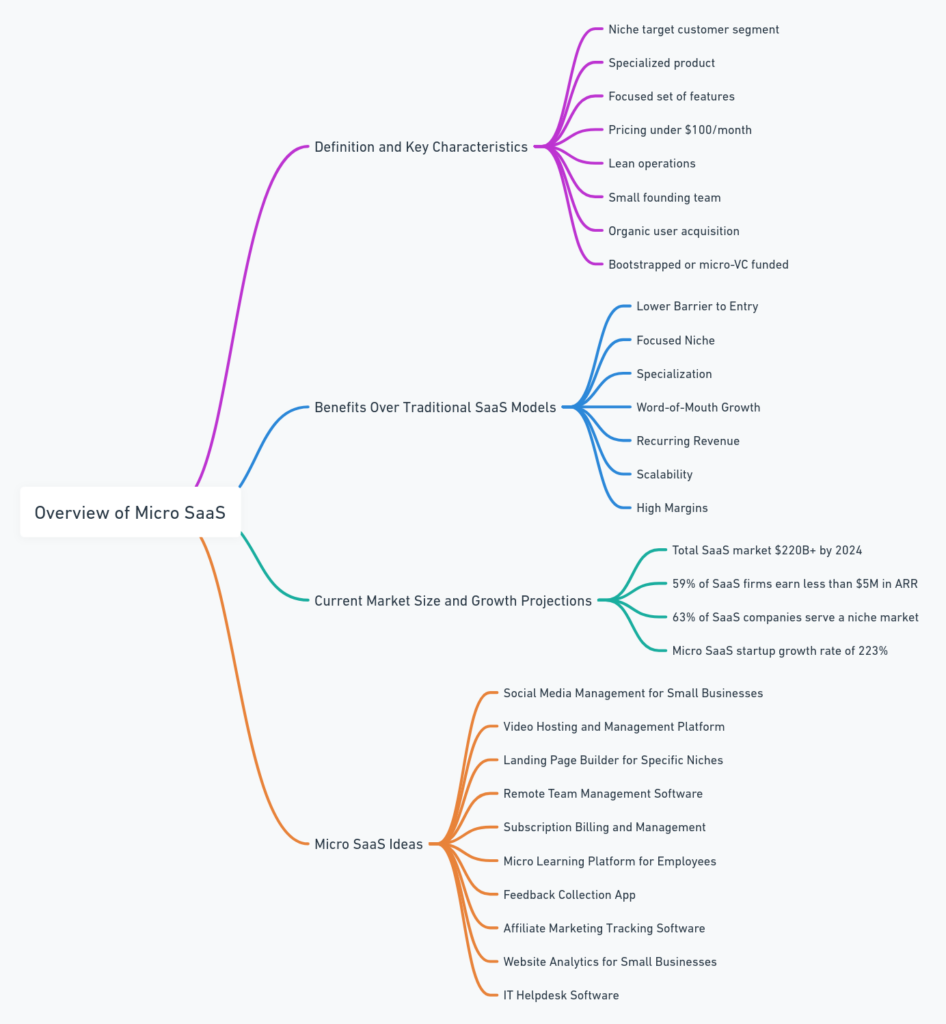Micro SaaS businesses are gaining immense popularity among entrepreneurs due to their lean operations, niche focus, and scalability potential. This blog post explores 10 innovative and promising Micro SaaS ideas that can be launched in 2024 to capitalize on this growing market.
The micro SaaS industry has seen tremendous growth over the past few years. According to Zion Market Research, the global SaaS market was valued at $134.44 billion in 2018 and is expected to grow to $220.21 billion by 2024. Much of this growth is being fueled by micro SaaS companies that serve specific niche markets with specialized solutions.
So what exactly is micro SaaS? It refers to software as a service (SaaS) businesses that have simple, low-cost subscription offerings focused on a narrow target customer segment. Unlike large enterprise SaaS companies, micro SaaS startups are extremely lean, requiring smaller teams and infrastructure to operate. This allows entrepreneurs to launch niche SaaS products without needing significant upfront investment.
Micro SaaS businesses also benefit from a recurring subscription revenue model that provides predictable cash flow. Once the initial customers are acquired, additional sales and growth become easier over time through word-of-mouth, referrals and other organic channels. This results in micro SaaS businesses having enviable margins and profitability compared to traditional software models.
According to renowned entrepreneur Tyler Tringas, the unique advantages of micro SaaS include:
- Niche focus and specialization
- Small reachable target market
- Simple and focused product
- Low overhead costs
- Organic and word-of-mouth customer acquisition
- High customer lifetime value
- Recurring revenue leading to predictable growth
This combination allows micro SaaS founders to maintain extreme operational efficiency and product/market fit as they scale towards 7+ figure revenues.

- Overview of Micro SaaS
- Idea #1: Social Media Management for Small Businesses
- Idea #2: Video Hosting and Management Platform
- Idea #3: Landing Page Builder for Specific Niches
- Idea #4: Remote Team Management Software
- Idea #5: Subscription Billing and Management
- Idea #6: Micro Learning Platform for Employees
- Idea #7: Feedback Collection App
- Idea #8: Affiliate Marketing Tracking Software
- Idea #9: Website Analytics for Small Businesses
- Idea #10: IT Helpdesk Software
- Conclusion
- Micro SaaS Ideas Related FAQs:
Overview of Micro SaaS
Definition and Key Characteristics
Micro SaaS refers to software as a service (SaaS) businesses that serve a narrow niche or specialized use case with a product priced under $100/month.
Key characteristics of micro SaaS businesses include:
- Niche target customer segment under 100,000 potential users
- Specialized product that dominates market niche
- Focused set of features with minimal complexity
- Pricing under $100/month for standard plan
- Lean operations with low overhead
- Small founding team of 1-3 people
- Organic and word-of-mouth user acquisition
- Bootstrapped or funded through micro-VC
Essentially, micro SaaS takes the fundamental SaaS principles of subscription billing, recurring revenue and scalability but packages it into a lightweight, targeted offering that requires less complexity to build and operate.
This allows founders to quickly validate and dominate niche idea without needing large teams or funding to launch their SaaS.
Benefits Over Traditional SaaS Models
Micro SaaS startups have several advantages over traditional enterprise SaaS models:
Lower Barrier to Entry: Micro SaaS businesses are easier to start because they require significantly less upfront capital and overhead to get up and running. First-time founders can validate their SaaS idea with a small seed investment.
Focused Niche: By targeting a small niche segment, micro SaaS startups can really understand customer pain points to build tailored solutions. This results in better product-market fit off the bat.
Specialization: Dominating a niche allows micro SaaS companies to fend off larger competitors through specialization. Larger general SaaS players have a hard time competing with targeted solutions.
Word-of-Mouth Growth: Happy niche customers drive organic growth by recommending the product to other similar users. This allows for free acquisition at scale.
Recurring Revenue: Subscription revenue results in predictable, recurring cash flow that funds growth. High customer lifetime value means the business is built to last.
Scalability: The subscription revenue model is highly scalable, allowing micro SaaS companies to expand into adjacent niche markets over time.
High Margins: Micro SaaS businesses maintain enviable margins due to recurring revenue and low overhead costs. This means incredible profitability.
By maintaining lean operations and taking advantage of recurring SaaS metrics, micro SaaS startups can sustainably scale towards 8+ figure revenues.
Current Market Size and Growth Projections
The micro SaaS industry is still in the early stages but shows immense growth potential. Here are some key stats:
- Total SaaS market projected to reach $220B+ by 2024 (Zion Market Research)
- 59% of SaaS firms earn less than $5M in ARR (OpensView)
- 63% of all SaaS companies serve a niche target market (SaaS Scout)
This shows most of the SaaS industry’s growth is driven by early-stage micro SaaS startups serving various niche segments.
Micro SaaS is a key segment experiencing massive YoY growth:
- Average micro SaaS startup growth rate of 223% (MicroStartups)
- The SaaS industry grew by over 30% YoY in 2021 (Blissfully)
- Niche SaaS products saw 40%+ increase in adoption due to digital transformation (G2)
As more businesses move their operations to the cloud, we expect the explosion of micro SaaS startups catering to niche use cases across industries.

Idea #1: Social Media Management for Small Businesses
Help SMBs Effectively Manage Their Social Media Presence
Small businesses often struggle with managing their social media presence across multiple platforms. A micro SaaS product can provide an easy way for SMB owners to schedule relevant content, engage with customers and analyze performance across channels like Instagram, Facebook, LinkedIn, Twitter etc.
By centralizing all social media management into a simple dashboard, this micro SaaS helps small businesses save time while optimizing their social presence.
Provide Content Scheduling, Analytics, Listening Tools Tailored to Their Needs
The product will help SMBs effectively manage social media activities:
Content Scheduling: Easily schedule and re-share content across platforms. Queue posts in advance and re-use content.
Performance Analytics: Track meaningful metrics like reach, engagement, clicks and sales per post . See what content resonates best.
Competitor Benchmarking: Compare performance to top competitors. Find opportunities to improve.
Hashtag Discovery: Discover trending hashtags and influencers in the niche to expand reach.
Social Listening: Monitor brand mentions and customer feedback across the web to respond quickly.
Engagement Toolkit: Respond to comments, messages and reviews across platforms via one dashboard.
By providing easy-to-use tools tailored to small business needs, this micro SaaS product can dominate the underserved SMB niche.
Competitors: Buffer, Hootsuite
While incumbents like Buffer and Hootsuite serve the broader social media management space, this micro SaaS niche focuses specifically on making the technology accessible for small business owners with limited resources and social media expertise.

Idea #2: Video Hosting and Management Platform
Video Hosting With Customized Branding
This micro SaaS idea provides affordable video hosting, storage and delivery for creators & businesses to share video content. Customers get customized video portals with their own branding, domains and layouts to showcase video content.
The product manages encoding, optimization, delivery across devices and collects viewer analytics to showcase reach. By handling complexity behind the scenes, anyone can easily publish beautiful video portals.
Advanced Analytics for Video Performance
The platform provides detailed analytics on video engagement and performance:
- Traffic source analysis
- Viewer location breakdown
- Drop-off rates by video content
- Engagement metrics like views, completion rates, clicks
- Referral sources bringing traffic
Advanced analytics allow creators and businesses to optimize video content for maximum reach and impact.
Add-On Editing and Creation Tools
The product can upsell customers into additional video creation tools:
- DIY video editing software
- Customizable video templates
- Drag and drop editing features
- Text/graphics overlays
- Interactive elements like quizzes
- Multi-language subtitling
This turns the platform into an end-to-end video management hub.
Competitors: Wistia, Vimeo
While Wistia and Vimeo cater to video marketers with premium tools, this micro SaaS niche focuses explicitly on easy video hosting with branded portals for businesses & creators selling to SMBs.
Idea #3: Landing Page Builder for Specific Niches
Create Landing Page Templates for Specific Niches/Industries
This micro SaaS app allows anyone to create optimized, high-converting landing pages targeted to different niches via customizable templates.
Niche templates for various industries:
Healthcare: Doctor websites, healthcare service pages
Legal: Lawyers, legal help portals, legal templates
Travel: Adventure trips, destination pages, booking sites
Fitness: Gym, training program and online course pages
Education: Online course, coaching and school templates
Marketplaces: Product launch, real estate, car sales templates
B2B Services: Consulting, SAAS service templates
The drag and drop editor simplifies customization while ensuring mobile responsiveness and SEO best practices are handled behind the scenes.
Competitors: Leadpages, Unbounce
While Unbounce and Leadpages offer landing page builders for marketers, this micro SaaS specializes in building conversion-optimized pages for specific niches like healthcare, legal, travel etc. Niche focus and ease-of-use are the differentiation.
Idea #4: Remote Team Management Software
Time Tracking, Task Management, File Sharing
This micro SaaS product helps remote teams collaborate by providing:
- Easy project and task management
- Time and productivity tracking for teams
- Centralized file sharing and cloud storage
- Team communication tools
It consolidates collaboration tools into one place and integrates with other popular remote work apps.
Integrations With Popular Remote Work Tools
The software integrates deeply with tools remote teams already use:
Video Chat: Zoom, Google Meet, Skype, UberConference integrations
Communication: Slack, Microsoft Teams integrations
File Sharing: Dropbox, Google Drive, Box sync and share capabilities
Project Management: Asana, Trello, Jira project management capabilities
Time Tracking: Harvest, Toggl time sheet integrations
Payments: PayPal, Stripe integration to send invoices and payments
This allows remote teams to manage all collaboration from one place.
Competitors: Trello, Asana
While Asana and Trello provide standalone project management capabilities, this micro SaaS consolidates a complete range of remote work tools to help distributed teams manage all aspects of working together independently of location.
Idea #5: Subscription Billing and Management
Automate Recurring Billing and Subscription Management
This micro SaaS app allows any business to easily set up and manage recurring billing for their subscribers. Key features include:
Billing Plans: Quickly build pricing plans with free trials, coupons, metered & tiered billing.
Payment Gateways: Collect payments via Stripe, Braintree, PayPal and other popular gateways.
Subscription Management: Manage real-time subscription status, cancellations, renewals and churn.
Invoice & Payments: Automate invoices, allow one-time & bulk payments. Handle taxes, currency etc.
API & Webhooks: Integrate subscription data with other apps via API and webhooks.
The platform handles all the complex backend for managing recurring payments and subscribers.
Integrate Payment Gateways Like Stripe
Pre-built integrations with leading payment gateways like Stripe handles complex compliance securely:
- Stripe integration for credit card processing
- PayPal, Braintree support
- Handles compliance for data protection regulation
- Level 1 PCI Certified for secure credit card data handling
Competitors: Chargebee, Recurly
While Chargebee and Recurly also handle subscription billing, this micro SaaS niche focuses explicitly on ease-of-use for small businesses selling digital subscriptions, memberships and online services.
Idea #6: Micro Learning Platform for Employees
Bite-Sized Training Content for Working Professionals
This micro SaaS app delivers bite-sized training programs to upskill working professionals via short 4-5 minute microlearning videos.
It focuses specifically on the corporate training niche delivering microlearning content for domains like:
- Sales
- Marketing
- Productivity
- Management
- Leadership
- Technology
Learners can access training content anywhere via mobile on topics most relevant to their daily work.
Custom Branding and Content Capabilities for Companies
The platform offers custom branding, content libraries and analytics for corporate training:
Branding: Company branding, colors and templates
Content Libraries: Upload company training materials
Custom Pathways: Curate pathways with internal content
Analytics: Track utilization, progress and engagement
This allows the product to be whitelabeled as an engaging training platform for employees.
Competitors: Axonify, EdApp
While Axonify and EdApp offer microlearning solutions for corporate training, this micro SaaS niche specifically focuses on building mobile-first bite-sized video content optimized for engagement and completion.
The use of videos and short format content sets this solution apart to serve corporate employees seeking just-in-time training.
Idea #7: Feedback Collection App
Gather Customer Feedback Via Targeted Surveys
This micro SaaS platform allows businesses to create targeted customer surveys to gather insights across the buyer journey. Surveys can collect feedback on:
- Product quality
- Feature requests
- Onboarding experience
- Customer support
- Net Promoter Scores
- Testimonial content
- Event satisfaction
- Case study interest
- Churn drivers
Advanced logic, conditional branching and segmentation features allow creating personalized survey flows to gather actionable insights.
Analyze Results and Share With Clients
The platform automatically analyzes survey responses using NLP and text analysis to surface key insights. Custom reports suitable for sharing provide:
- Summary analysis
- Text highlights
- Sentiment analysis
- Suggested actions
This allows easily gathering and sharing powerful customer insights.
Competitors: SurveyMonkey, Typeform
While SurveyMonkey and Typeform offer survey builders, this micro SaaS specializes in building targeted feedback flows for improving customer experiences and lowering churn.
Idea #8: Affiliate Marketing Tracking Software
Track Affiliate Sales and Partnerships
This micro SaaS platform helps businesses track and optimize their affiliate marketing partnerships by providing:
- Affiliate relationship management
- Customizable referral links
- Attribution tracking across devices
- Fraud protection
- Commission calculations
- Automated payment workflows
By centralizing affiliate tracking, businesses can grow and optimize referral partnerships for customer acquisition.
Automate Payouts and Commission Workflows
The platform handles commission workflows like:
- Performance metrics per affiliate
- Minimum payment thresholds
- Custom commission structures
- Coupons tracking
- Lifetime value tracking
- Automated payment processing
This simplifies managing scalable affiliate programs.
Competitors: Refersion, LeadDyno
While Refersion and LeadDyno focus broadly on affiliate tracking, this micro SaaS specializes specifically in maximizing customer conversion rates from affiliate channels by optimizing attribution, fraud protection and commissions.
Idea #9: Website Analytics for Small Businesses
Provide Easy-to-Use Analytics Without Coding Skills Needed
This micro SaaS provides a business intelligence dashboard for small business owners to track website analytics without needing developers. Key metrics include:
Traffic Analysis
- Visitors
- Page views
- Traffic sources
- Location
Engagement
- Pages/session
- Time on site
- Bounce rates
Conversions
- Form fills
- Phone call tracking
- Email clicks
- Document downloads
Marketing
- SEO performance
- Social media clicks
- Campaign tracking
The dashboard simplifies analysis for business owners rather than technical users.
Support for Small Business Owners With Actionable Insights
The platform provides easy-to-understand reports and recommendations for owners:
- Summary snapshots
- Metric benchmarks
- Trend analysis
- Conversion rate optimization
- Traffic growth opportunities
- Customer engagement opportunities
Business owners get insights to grow their website traffic, engagement and sales.
Competitors: Google Analytics, Hotjar
This competes with Google Analytics and Hotjar by tailoring website analytics specifically to small business owners with intuitive, non-technical reporting.
Idea #10: IT Helpdesk Software
Custom Ticketing System for Managed IT Service Providers
This micro SaaS provides an easy IT help desk and client portal for IT services companies managing small business IT infrastructure and support. Key features:
Ticketing System
- Email, portal, API ticketing
- Ticket routing
- SLA tracking
Knowledge Base
- Public knowledge base
- Private internal pages
Client Portal
- Client reporting
- Billing overview
- Ticket submission
- Documentation access
Integrations
- RMM tools
- Remote access
- Network monitoring
Client Portal and Knowledge Base Capabilities
The portal allows clients to easily submit tickets, track status, access documentation and view billing:
Tickets
- Submit new tickets
- Commenting
- Ticket status
Billing
- Invoices
- Payment history
- Balance dues
Knowledge Base
- Public articles
- Private documentation
This increases first-call resolution while lowering client support costs.
Competitors: Freshdesk, Zendesk
While Freshdesk and Zendesk offer multi-channel helpdesks, this micro SaaS specializes specifically in managed IT services providers to improve customer support and transparency.
Conclusion
Micro SaaS represents an incredible opportunity to build niche software businesses serving specialized customer segments while taking advantage of recurring SaaS metrics.
As this post explored, there exist many promising untapped micro SaaS ideas that can be built with lean teams and funding to take over niche markets. The micro SaaS model allows validating ideas quickly and scaling towards 7-figure ARR through word-of-mouth growth.
Whether you want to automate small business workflows, provide analytics to specific industries or improve employee productivity – micro SaaS ideas unlock the ability to tailor software solutions to specialized use cases in a sustainable way.
With the rise of no-code and low-code platforms, launching and iterating Micro SaaS ideas is faster than ever. We expect the next wave of SaaS innovation to come from solo founders and micro-teams identifying niche pain points and scaling solutions to dominate these markets.
The time is now ripe to tap into underserved niches and build the next generation of vertical SaaS winners!

Micro SaaS Ideas Related FAQs:
What are some popular micro SaaS examples?
Popular micro SaaS examples include Buffer for social media management, Calendly for appointment scheduling, and Plausible for simple web analytics. These niche products solve specific problems for targeted customer segments.
How to generate micro SaaS ideas?
Analyze niche forums and communities to identify friction points, review app stores and marketplaces for gaps, and brainstorm around specialized use cases not served well by current tools.
Are there any unique micro SaaS ideas for 2024?
Yes, ideas like remote team management platforms, micro learning video platforms for employee training, and affiliate marketing automation tools are some unique micro SaaS opportunities for 2024.
How to identify frustration points for micro SaaS?
Immerse in target user communities to spot complaints and pain points. Directly engage users by posting questions. Review negative comments and low-rated products to find gaps.
What are some profitable micro SaaS business models?
Specialized niche focus, recurring subscription revenue, automated sales funnels, targeted content marketing, and lightweight support models can make micro SaaS highly profitable on a small scale.
What tools help in micro SaaS idea validation?
Surveys, interviews, prototype tests, niche community posts, competitor analysis, and market size research help validate if a micro SaaS idea addresses real target user needs.
How to differentiate from competitors with micro SaaS?
Specialize on an underserved niche, solve overlooked user problems, provide better UX, offer unique features, integrate with popular tools, and leverage newer technologies.
What are strategies for marketing micro SaaS?
SEO, niche content, community engagement, referrals, targeted ads, freemium models, free trials, and special launch offers help market and acquire users for micro SaaS.
How to scale a micro SaaS after launch?
Expanding to adjacent niches, releasing new features, strategic integrations, API access, affiliate programs, and raising prices help scale an established micro SaaS.
What are the best no-code tools for micro SaaS?
Bubble, Webflow, AppMaster, Adalo, Glide, Thunkable, and AppSheet are some of the best no-code platforms to build, launch and scale micro SaaS ideas.
